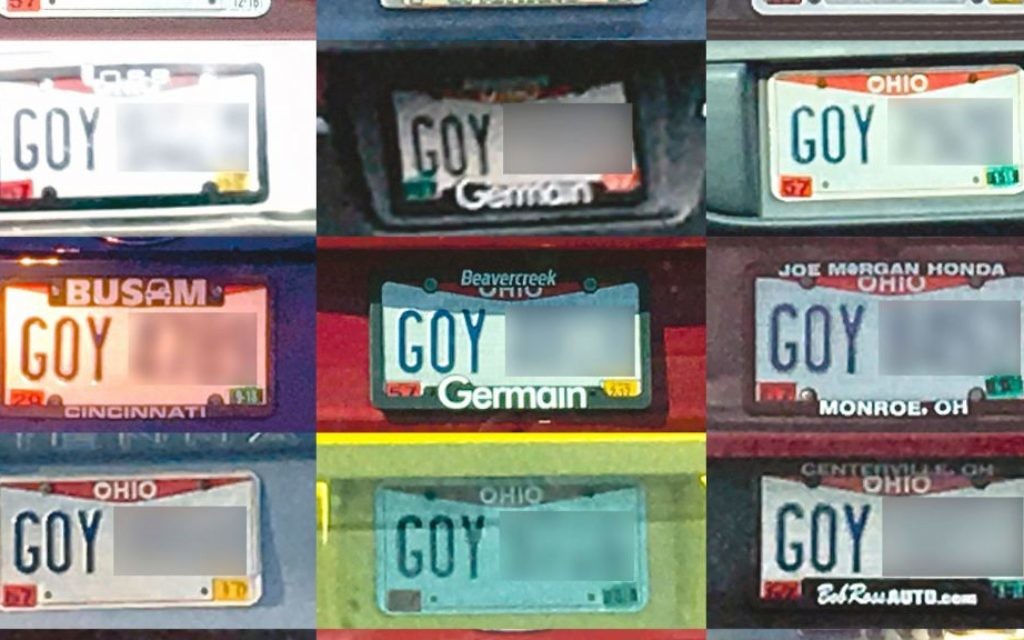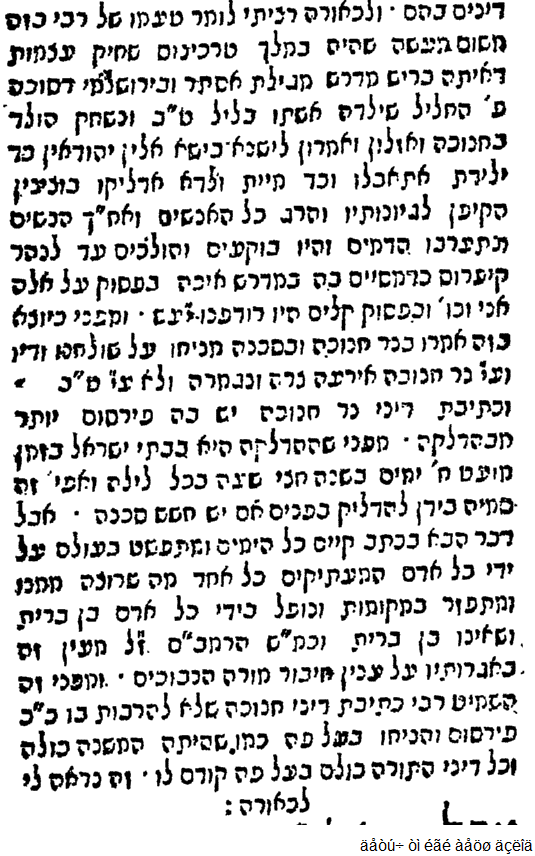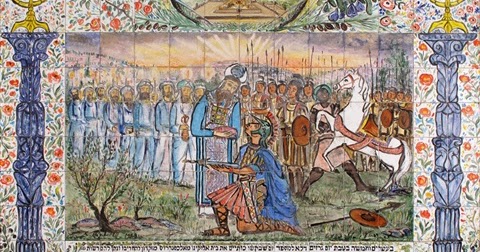BS”D
Shkolim 4b
Teves 14, 5784. December 26, 2023
1 – The גמרא concludes with a source for the opinion of ריש לקיש that no donation for the בית המקדש in whatever form may ever be accepted from a גוי.
וַיֹּאמֶר לָהֶם זְרֻבָּבֶל וְיֵשׁוּעַ וּשְׁאָר רָאשֵׁי הָאָבוֹת לְיִשְׂרָאֵל לֹא לָכֶם וָלָנוּ לִבְנוֹת בַּיִת לֵאלֹהֵינוּ כִּי אֲנַחְנוּ יַחַד נִבְנֶה לַיהוָה אֱלֹהֵי יִשְׂרָאֵל כַּאֲשֶׁר צִוָּנוּ הַמֶּלֶךְ כּוֹרֶשׁ מֶלֶךְ פָּרָס.
2 – We discussed the topic of accepting צדקה from a גוי.
Here are the places in Shulchan Aruch where it seems quite clear that it is prohibited.
There are of course solid sources that allow it under certain circumstances.
We mentioned the famous חסיד of the צמח צדק, Reb Eliyaho Yosef Rivlin, who authored a ספר that is considered the basis for all discussions on this topic.
See story in סיפורי חסידים, זוין ע’ 456ץ
Starts here in his אוהלי יוסף ספר.

3 – We continued with the קלבון.
Basically, there are two reason for adding this extra small amount.
According to Reb Meir it is מדאורייתא, since משה רבינו was shown a מטבע של אש one needs to be certain that his מחצית השקל is a full half of a שקל.
/https://tf-cmsv2-smithsonianmag-media.s3.amazonaws.com/filer_public/c3/27/c327e3e3-877a-46c8-bb91-637f4f1c20e4/ewrwer.jpg)
When a שקל is minted there is a chance that the weight of the metal is not a full שקלs worth of silver. Ditto for a half a שקל. Thus, one needs to add a קלבון, another small coin that is a 1/12 of a מחצית השקל.
On the other hand, the opinion of the חכמים is that the reason for the קלבון is a fee for the transaction. It is paid to either the שולחני or the גזבר of הקדש for exchanging a full שקל for two halves.

4 – We returned back to the topic of the כותים and the expression of the גמרא in Chulin 6a that they were declared as “non-Jews”. See Shiur Shkolim 3b (3) – Chanukah – 12/12/23.
The Chasam Sofer takes issue with this idea of proclaiming someone as a גוי!

Now, as per the שולחן ערוך, this proclamation was only לחומרא, meaning that after the proclamation if a כותי touches wine we considered this wine as if a גוי touched it. That’s לחומרא.
However, לקולא, we still consider them יהודים. So say, for example, if a woman, after the proclamation accepted קידושין from a כותי, she would require a גט.
However, according to the Rambam, the כותים are considered גויים ממש, even לקולא. The obvious question is where do the חכמים get this power to change the religious status of a person.

See here the Tosfos Yom Tov (7, 4) who also asks this question.
[Parenthetically we asked why he doesn’t mention the גמרא about the עשרת השבטים where a similar edict was issued, Yevamos 17a].
5 – The Chasam Sofer answers that the source for this authority come from our גמרא on 3a.
The גמרא there brings as a source for הפקר בית דין הפקר a פסוק.
וְכֹל אֲשֶׁר לֹא יָבוֹא לִשְׁלֹשֶׁת הַיָּמִים כַּעֲצַת הַשָּׂרִים וְהַזְּקֵנִים יָחֳרַם כָּל רְכוּשׁוֹ.
That means that בית דין can impound private assets.
The end of the פסוק is even more powerful:
וְהוּא יִבָּדֵל מִקְּהַל הַגּוֹלָה.
‘And he will be ousted from כלל ישראל’.
This means, as per the Chasam Sofer, that בית דין can actually pronounce an individual or community as non Jewish!
6 – We concluded by going back to the topic of why רבי didn’t create a מסכת חנוכה.
We mentioned the עדות ביהוסף and his original idea that מגילת תענית is actually מסכת חנוכה and there was no need for רבי to rewrite it.

He offers another reason based on the story of the destruction of the community in Alexandria which we encountered in Suka 51b.
The Yerushalmi adds to the story as to what caused King Tarchinus (In Sukkah it is Alexander the Great) to annihilate this thriving community.

Ancient Synagogue of Alexandria
In short: King Tarchinus’s son was born on Tisha B’Ov and passed away on Chanukah. Someone informed the king that upon his son’s birth Jews were in mourning and upon his death they celebrated!
This caused the king to annihilate the community of Alexandria.
Thus, Chanukah was practiced under the radar.

Alexander kneeling before Shimon Hatzadik – Yuma, 69a
Accordingly רבי didn’t want to publicize חנוכה by creating a separate מסכת!
Here is the Yerushalmi :
תַּנֵּי רִבִּי שִׁמְעוֹן בֶּן יוֹחַי: בִּשְׁלֹשָׁה מְקוֹמוֹת הוּזְהָרוּ יִשְׂרָאֵל שֶׁלֹּא לָשׁוּב אֶרֶץ מִצְרַיִם, {שֶׁנֶּאֱמַר:}ג כִּי אֲשֶׁר רְאִיתֶם אֶת מִצְרַיִם הַיּוֹם לֹא תוֹסִיפוּ לִרְאוֹתָם עוֹד עַד עוֹלָם, וַי״י אָמַר לָכֶם לֹא תוֹסִיפוּן לָשׁוּב בַּדֶּרֶךְ הַזֶּה עוֹד, וֶהֱשִׁיבְךָ י״י מִצְרַיִם בָּאֳנִיּוֹת. וּבִשְׁלָשְׁתָּן חָזְרוּ וּבִשְׁלָשְׁתָּן נָפְלוּ: אַחַת בִּמֵי סַנְחֵרִיב מֶלֶךְ אַשּׁוּר, {שֶׁנֶּאֱמַר:}ד הוֹי הַיֹּרְדִים מִצְרַיִם לְעֶזְרָה, מַה כְתִיב בַּתְרֵיהּ: וּמִצְרַיִם אָדָם וְלֹא אֵל וְסוּסֵיהֶם בָּשָׂר וגו׳. וְאַחַת בִּימֵי יוֹחָנָן בֶּן קָרֵחַ, וְהָיְתָה הַחֶרֶב אֲשֶׁר אַתֶּם יְרֵיאִים מִמֶּנָּה שָׁם תַּשִּׂיג אֶתְכֶם וגו׳. וְאַחַת בִּימֵי טְרוֹגְייָנוּס הָרָשָׁע*.
(ו) נוֹלַד לוֹ בֶן בְתִשְׁעָה בְאַב וְהָיוּ מִתְעַנִּין. מֵת בִּתּוֹ בַחֲנוכָּה וְהִדְלִיקוּ נֵירוֹת. שָׁלְחָה אִשְׁתּוֹ וְאָמְרָה לוֹ: עַד שֶׁאַתְּ מְכַבֵּשׁ אֶת הַבַּרְבָּרִיִּים, בוֹא וּכְבִישׁ אֶת הַיְּהוּדִים שֶׁמָּרְדוּ בָךְ. חָשֵׁב מֵיתֵי לַעֲשָׂרָה יוֹמִין וַאֲתָא לַחֲמִשָּׁה. אֲתַא וָאַשְׁכַּחוֹן עֲסִיקִין {בְּאוֹרַייְתָא בִּפְסוּקָא}ה יִשָּׂא י״י עָלֶיךָ גּוֹי מֵרָחֹק מִקְצֵה הָאָרֶץ וגו׳. אֲמַר לוֹן: מַה הֲוִיתוֹן עֲסִיקִין. אָמְרוֹן לֵיהּ: הָכֵין וָכֵן. אֲמַר לוֹן: הַהוּא גַבְרָא הוּא דַחֲשַׁב מֵיתֵי לַעֲשָׂרָה יוֹמִין וַאֲתָא לַחֲמִשָּׁה. וְהִקִּיפָן לִיגְיוֹנוֹת וְהָרְגָן. אֲמַר לִנְשֵׁיהֶן: נִשְׁמָעוֹת אַתֶּם לְלִיגְיוֹנוֹתַיי וְאֵין אֲנִי הוֹרֵג אֶתְכֶם. אָמְרוֹן לֵיהּ: מַה דְעַבְדַּת בָּאֲרַעִייָא עֲבִיד בְּעִילִייָא. וְעִירֵב דָּמָן בְּדָמָן וְהָלַךְ הַדָּם בַּיָּם עַד קִיפְּרוֹס. בְּאוֹתָהּ שָׁעָה נִגְדְּעָה קֶרֶן יִשְׂרָאֵל וְעוֹד אֵינָהּ עֲתִידָה לַחְזוֹר לִמְקוֹמָהּ עַד שֶׁיָּבוֹא בֶּן דָּוִד.
*Perhaps Trajan, Taanis 18b, and Jastrow